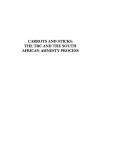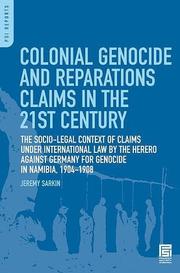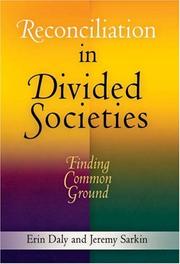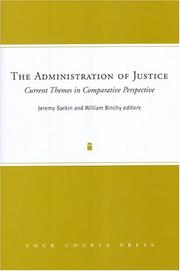| Listing 1 - 10 of 16 | << page >> |
Sort by
|

ISBN: 9050954006 Year: 2004 Publisher: Antwerp Intersentia
Abstract | Keywords | Export | Availability | Bookmark
 Loading...
Loading...Choose an application
- Reference Manager
- EndNote
- RefWorks (Direct export to RefWorks)
Human rights --- Criminal law. Criminal procedure --- National movements --- South Africa --- Amnesty --- Political crimes and offenses --- Truth commissions --- Commissions, Truth --- Reconciliation commissions --- Governmental investigations --- Offenses, Political --- Political offenses --- Crime --- Extradition --- Political violence --- Subversive activities --- South Africa. --- Commission for Truth and Reconciliation (South Africa) --- South African Truth Commission --- TRC --- Truth and Reconciliation Commission (South Africa) --- Offenses against the State --- State, Offenses against the --- Droit pénal --- Extinction des peines --- Afrique du sud --- Amnistie
Book
ISBN: 9781847010322 9781919895475 1847010326 1919895477 9781846159374 9786613772480 1846159377 1281017183 Year: 2011 Publisher: Cape Town, South Africa UCT Press
Abstract | Keywords | Export | Availability | Bookmark
 Loading...
Loading...Choose an application
- Reference Manager
- EndNote
- RefWorks (Direct export to RefWorks)
In 1904, the indigenous Herero people of German South West Africa (now Namibia) rebelled against their German occupiers. In the following four years, the German army retaliated, killing between 60,000and 100,000 Herero people, one of the worst atrocities ever. The history of the Herero genocide remains a key issue for many around the world partly because the German policy not to pay reparations for the Namibian genocide contrasts with its long-standing Holocaust reparations policy. The Herero case bears not only on transitional justice issues throughout Africa, but also on legal issues elsewhere in the world where reparations for colonial injustices have been called for.
This book explores the events within the context of German South West Africa (GSWA) as the only German colony where settlement was actually attempted. The study contends that the genocide was not the work of one rogue general or the practices of the military, but that it was inexorably propelled by Germany's national goals at the time. The book argues that the Herero genocide was linked to Germany's late entry into the colonial race, which led it frenetically and ruthlessly to acquire multiple colonies all over the world within a very short period, using any means available.
Jeremy Sarkin is Chairperson-Rapporteur of the United Nations Working Group on Enforced or Involuntary Disappearances, and is at present Distinguished Visiting Professor of Law at Hofstra University in Hempstead, New York. He is also an Attorney of the High Court of South Africa and of the State of New York. A graduate of the University of the Western Cape and of Harvard Law School he has been visiting professor at several US universities where he has taught Comparative Law, International Human Rights Law, International Criminal Law and Transitional Justice
Southern Africa (South Africa, Botswana, Lesotho, Swaziland, Namibia and Zimbabwe): University of Cape Town Press/Juta
Genocide --- Herero (African people) --- Génocide --- Herero (Peuple d'Afrique) --- History --- Histoire --- William --- Namibia --- Namibie --- Génocide --- Cleansing, Ethnic --- Ethnic cleansing --- Ethnic purification --- Ethnocide --- Purification, Ethnic --- Crime --- Vilʹgelʹm --- Wilhelm --- Guilelmus --- Wei-lien --- Vilkhelm --- Friedrich Wilhelm Viktor Albert, --- Guillaume --- Guillermo --- History. --- German South West Africa. --- Germany's national goals. --- Herero genocide. --- Kaiser Wilhelm II. --- colonial injustices. --- colonial race. --- transitional justice.
Book
ISBN: 9781780687940 178068794X 9781780687957 1780687958 Year: 2019 Publisher: Cambridge Intersentia
Abstract | Keywords | Export | Availability | Bookmark
 Loading...
Loading...Choose an application
- Reference Manager
- EndNote
- RefWorks (Direct export to RefWorks)
The Global Impact and Legacy of Truth Commissions' emerges at a time when there is a confluence of two trends. The first is a growing critique of truth commissions as being unresponsive to the socio-economic needs of transitional societies as part of growing criticism of transitional justice as a whole. The second is the increasing use, salience, professionalism and ambition of truth commissions. Thus, the book is published at a time when truth commissions are being both doubted and reified like never before. In this context, the book's purpose is to understand the impact and legacy of these institutions over the past fifty years. Bringing together many prominent voices on the topic, this book investigates what kind of impact and legacy (possibly 100) truth commissions have had on the societies in which they have taken place, and for future truth commissions the world over.
Truth commissions. --- Commissions vérité et réconciliation. --- Law of armed conflicts. Humanitarian law --- Human rights --- Criminal law. Criminal procedure --- Justice transitionnelle. --- Droit à la vérité (droit international) --- Processus de paix. --- Truth commissions --- Commissions, Truth --- Reconciliation commissions --- Governmental investigations --- Commissions vérité et réconciliation --- Commissions vérité et réconciliation. --- Droit à la vérité (droit international)
Book
ISBN: 9781032056630 1032056630 9781032056647 1032056649 Year: 2022 Publisher: Abingdon, Oxon ; New York, NY : Routledge,
Abstract | Keywords | Export | Availability | Bookmark
 Loading...
Loading...Choose an application
- Reference Manager
- EndNote
- RefWorks (Direct export to RefWorks)
"This book explores, through the lens of the conflict in Syria, why international law and the United Nations have failed to halt conflict and massive human rights violations in many places around the world. The work presents a critical socio-legal analysis of the failures of international law and the United Nations to deal with mass atrocities and conflict. It argues that international law, in the way it is set up and the way it operates, falls short in dealing with these issues in many respects. The argument is that international law is state-centred rather than victim-friendly, is to some extent outdated, is vague and often difficult to understand, and therefore, at times, hard to apply. While various accountability processes have come to the fore recently, processes do not exist to assist individual victims while the conflict occurs, or the abuses are being perpetrated. The book focuses on the problems of international law and the UN, and, in the context of the many enforced disappearances and arbitrary detentions in Syria, why nothing has been done to deal with a rogue state that has regularly violated international law. It examines why the Responsibility to Protect (R2P) has not been applied, and why it ought to be used, generally and in Syria. It uses the Syrian context to evaluate the weaknesses of the system and why reform is needed. It examines the UN institutional mechanisms, the role they play and why a civilian protection system is needed. It examines what mechanism ought to be set up to deal with the possible one million people that have been disappeared and detained in Syria"--
Humanitarian law --- Responsibility to protect (International law) --- Political persecution --- Disappeared persons --- Detention of persons --- War victims --- Criminal procedure --- Desaparecidos --- Missing persons --- Victims of state-sponsored terrorism --- Political repression --- Repression, Political --- Persecution --- Civil rights --- International law --- Humanitarian conventions --- International humanitarian law --- War (International law) --- Law and legislation --- Syria --- Sirii︠a︡ --- Iqlīm al-Sūrī (United Arab Republic) --- Iqlīm al-Shamālī (United Arab Republic) --- Syrian Region (United Arab Republic) --- سوريا --- Sūriyā --- Jumhūrīyah al-ʻArabīyah al-Sūrīyah --- Syrian Arab Republic --- République arabe syrienne --- Sowria --- Syrie --- R.A.S. --- RAS --- Ittiḥād al-Duwal al-Sūrīyah --- Fédération des États de Syrie --- Syrische Arabische Republik --- SAR --- Suryah --- Arabska Republika Syryjska --- Syrien --- Jumhuriya al-Arabya as-Suriya --- Repubblica Araba Siriana --- جمهورية العربية السورية --- Jumhūriyyah al-ʻArabiyyah as-Sūriyyah --- Сірыя --- Siryi︠a︡ --- Сірыйская Арабская Рэспубліка --- Siryĭskai︠a︡ Arabskai︠a︡ Rėspublika --- Сирийската арабска република --- Siriĭskata arabska republika --- Συρία --- Αραβική Δημοκρατία της Συρίας --- Aravikē Dēmokratia tēs Syrias --- 시리아 --- Siria --- סוריה --- רפובליקה הערבית הסורית --- Republiḳah ha-ʻArvit ha-Surit --- シリア --- Shiria --- Сирия --- Сирийская Арабская Республика --- Siriĭskai︠a︡ Arabskai︠a︡ Respublika --- Сирія --- Syrii︠a︡ --- Сирійська Арабська республіка --- Syriĭsʹka Arabsʹka respublika --- 敘利亞 --- Xuliya --- United Arab Republic --- History --- Law and legislation. --- Atrocities. --- Politics and government --- Victims of war --- Victims --- Droit humanitaire. --- Responsabilité de protéger (droit international) --- Répression politique. --- Personnes disparues. --- Victimes de guerre. --- Syrie. --- Droit --- Atrocités --- Droit humanitaire --- Répression politique --- Personnes disparues --- Victimes de guerre --- Responsabilité de protéger (droit international) --- Répression politique --- Atrocités

ISBN: 9780313362569 Year: 2008 Publisher: Westport (Conn.) PSI
Abstract | Keywords | Export | Availability | Bookmark
 Loading...
Loading...Choose an application
- Reference Manager
- EndNote
- RefWorks (Direct export to RefWorks)
Herero (African people) --- Reparations for historical injustices --- Reparations --- Germany --- Namibia --- Trials, litigation, etc. --- History --- Reparations.
Book
ISBN: 9780896802650 Year: 2008 Publisher: Cape Town HSRC Press
Abstract | Keywords | Export | Availability | Bookmark
 Loading...
Loading...Choose an application
- Reference Manager
- EndNote
- RefWorks (Direct export to RefWorks)
Human rights --- Juvenile delinquents --- Prisons --- Prisons --- Women prisoners --- Overcrowding
Digital
ISBN: 9781846159374 Year: 2011 Publisher: Cape Town, South Africa UCT Press
Abstract | Keywords | Export | Availability | Bookmark
 Loading...
Loading...Choose an application
- Reference Manager
- EndNote
- RefWorks (Direct export to RefWorks)

ISBN: 9780812239768 0812239768 Year: 2007 Publisher: Philadelphia, Pa University of Pennsylvania Press
Abstract | Keywords | Export | Availability | Bookmark
 Loading...
Loading...Choose an application
- Reference Manager
- EndNote
- RefWorks (Direct export to RefWorks)
Social change --- Political systems --- Reconciliation --- Political aspects. --- Change, Social --- Cultural change --- Cultural transformation --- Societal change --- Socio-cultural change --- Social history --- Social evolution --- Peace making --- Peacemaking --- Reconciliatory behavior --- Quarreling --- Political aspects
Book
ISBN: 1283897350 081220638X 0812221249 Year: 2007 Publisher: Philadelphia, Pa. : University of Pennsylvania Press,
Abstract | Keywords | Export | Availability | Bookmark
 Loading...
Loading...Choose an application
- Reference Manager
- EndNote
- RefWorks (Direct export to RefWorks)
"As nations struggling to heal wounds of civil war and atrocity turn toward the model of reconciliation, Reconciliation in Divided Societies takes a systematic look at the political dimensions of this international phenomenon. . . . The book shows us how this transformation happens so that we can all gain a better understanding of how, and why, reconciliation really works. It is an almost indispensable tool for those who want to engage in reconciliation"-from the foreword by Archbishop Emeritus Desmond TutuAs societies emerge from oppression, war, or genocide, their most important task is to create a civil society strong and stable enough to support democratic governance. More and more conflict-torn countries throughout the world are promoting reconciliation as central to their new social order as they move toward peace and stability.Scores of truth and reconciliation commissions are helping bring people together and heal the wounds of deeply divided societies. Since the South African transition, countries as diverse as Timor Leste, Sierra Leone, Fiji, Morocco, and Peru have placed reconciliation at the center of their reconstruction and development programs. Other efforts to promote reconciliation-including trials and governmental programs-are also becoming more prominent in transitional times. But until now there has been no real effort to understand exactly what reconciliation could mean in these different situations. What does true reconciliation entail? How can it be achieved? How can its achievement be assessed? This book digs beneath the surface to answer these questions and explain what the concepts of truth, justice, forgiveness, and reconciliation really involve in societies that are recovering from internecine strife.Looking to the future as much as to the past, Erin Daly and Jeremy Sarkin maintain that reconciliation requires fundamental political and economic reform along with personal healing if it is to be effective in establishing lasting peace and stability. Reconciliation, they argue, is best thought of as a means for transformation. It is the engine that enables victims to become survivors and divided societies to transform themselves into communities where people work together to raise children and live productive, hopeful lives. Reconciliation in Divided Societies shows us how this transformation happens so that we can all gain a better understanding of how and why reconciliation is actually accomplished.
Reconciliation --- Social change --- Change, Social --- Cultural change --- Cultural transformation --- Societal change --- Socio-cultural change --- Social history --- Social evolution --- Peace making --- Peacemaking --- Reconciliatory behavior --- Quarreling --- Political aspects. --- Anthropology. --- Folklore. --- Human Rights. --- Law. --- Linguistics. --- Political Science.

ISBN: 1851828370 Year: 2004 Publisher: Dublin Four Courts Press
Abstract | Keywords | Export | Availability | Bookmark
 Loading...
Loading...Choose an application
- Reference Manager
- EndNote
- RefWorks (Direct export to RefWorks)
| Listing 1 - 10 of 16 | << page >> |
Sort by
|

 Search
Search Feedback
Feedback About UniCat
About UniCat  Help
Help News
News